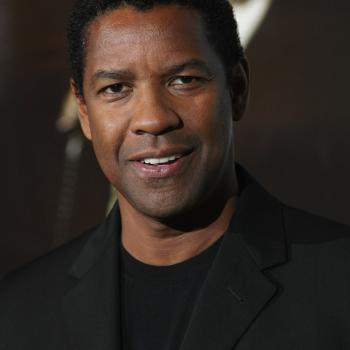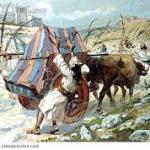
“Why doesn’t God do something?” Habakkuk asked that question, and another: “Why would God do that?” What can we learn from God’s response?
Scripture:
Habakkuk, chapters 1-3; John, chapter 8
Habakkuk 1:12 – 2:1 (CEB):
Lord, aren’t you ancient, my God, the holy one? Don’t let us die. Lord, you put the Chaldean here for judgment. Rock, you established him as a rebuke. Your eyes are too pure to look on evil; you are unable to look at disaster. Why would you look at the treacherous or keep silent when the wicked swallows one who is more righteous?
You made humans like the fish of the sea, like creeping things with no one to rule over them. The Chaldean brings all of them up with a fishhook. He drags them away with a net; he collects them in his fishing net, then he rejoices and celebrates. Therefore, he sacrifices to his net; he burns incense to his fishing nets, because due to them his portion grows fat and his food becomes luxurious. Should he continue to empty his net and continue to slay nations without sparing them?
I will take my post; I will position myself on the fortress. I will keep watch to see what the Lord says and how he will respond to me.
Observations: Why Doesn’t God Do Something?
The book of Habakkuk is mostly a dialogue between God and the prophet. Habakkuk begins by complaining about all of the violence and injustice that is all around him. (Sound familiar?) The nation that once followed God now was just like all the other nations. “There is strife, and conflict abounds. The Instruction is ineffective; justice does not endure because the wicked surround the righteous. Justice becomes warped” (Habakkuk 1:3-4). Again, does that sound familiar?
God responds by assuring Habakkuk that he was about to act. “Look at the nations and watch!… I am about to rouse the Chaldeans…” (Habakkuk 1:5-6). The “Chaldeans” were the Babylonians, whom God was going to use to bring judgment on Judah. God planned to “rouse” them to attack and conquer Judah and take the Jews into captivity.
Well, Habakkuk didn’t like that answer! His response is the passage I’ve included above. In effect, what Habakkuk says is this: “How can you use them to punish your people? The Chaldeans are wicked! Why would you look at the treacherous or keep silent when the wicked swallows one who is more righteous?”
Why Would God Do That?
In other words, Habakkuk asks, “Why would you do that, God? Why would you use the wicked to punish the righteous?” The answer, in part, is that the “righteous” weren’t righteous at all. Habakkuk had already referenced their sins in asking God how long he was going to wait to do something. The people didn’t follow the Law (the “Instruction” in the CEB translation). Violence and injustice, strife and conflict.
Habakkuk’s problem wasn’t that God would punish Judah; it’s that God would use the Chaldeans to do it. They were worse than the Jews, by a long shot! They were guilty of violence and injustice and greed, but on top of that they didn’t worship God. He sacrifices to his net; he burns incense to his fishing nets.The Chaldeans were so bad that surely God wouldn’t use them to execute his judgment! Haggai closes his comments with this statement: I will keep watch to see what the Lord says to me and how he will respond to my complaint.
Application: Why Would God Do That?
Well, God answers Habakkuk. “There is still a vision for the appointed time; it testifies to the end; it does not deceive. If it delays, wait for it; for it is surely coming, it will not be late” (Habakkuk 2:3). In his time, God would punish the Chaldeans – just as he had the Assyrians before them, and the Philistines before them, and the Egyptians before them. In the end, God will be vindicated, and he will be shown to be sovereign. “But the land will be full of the knowledge of the Lord’s glory, just as the water covers the sea” (Habakkuk 2:14).
I think one of the big mistakes that we make is that we think that God has to explain or justify himself to us. Nope! He is God, and we are not (no matter how hard we try). He has demonstrated his power and majesty throughout time, so everyone could see. “This is because what is known about God should be plain to them because God made it plain to them. Ever since the creation of the world, God’s invisible qualities – God’s eternal power and divine nature – have been clearly seen, because they are understood through the things God has made. So humans are without excuse” (Romans 1:19-20).
Instead of wondering why would God do that, or some other form of that question, we should remind ourselves that in his time, God will set all things right. If it delays, wait for it; for it is surely coming; it will not be late. We should also be grateful for God’s patience. “The Lord isn’t slow to keep his promise, as some think of slowness, but he is patient toward you, not wanting anyone to perish but all to change their hearts and lives” (2 Peter 3:9).
Why Doesn’t God Do Something?
He already has; he sent his Son. And he will do something, when it’s time. In the meantime, he expects us to do something! He calls us to be about the work of his kingdom – proclaiming good news, loving one another, and glorifying him. I don’t think God wants us waiting around to keep watch to see what his answer is. We already know what his answer is: Jesus!
Prayer:
Father, thank you for reminding us that your plan will happen; you will bring to pass what you have declared. Whenever we wonder why you don’t do something, remind us what we are supposed to do. And when we ask, “why would God do that?” remind us that your ways are not our ways. You are so far above us that we couldn’t begin to fully comprehend your ways. You graciously lead us; help us to follow. Amen.
















